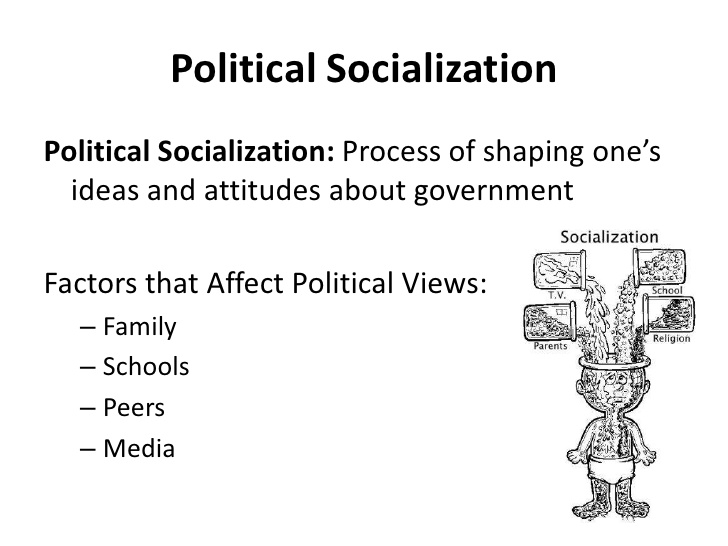Imagine a child, barely old enough to tie their shoes, sitting at the kitchen table, listening intently as their family discusses the upcoming election. “Why are we voting for Mr. Smith?” they ask, their eyes wide with curiosity. Their parent, perhaps a lifelong Democrat, might explain their stance, emphasizing the importance of supporting policies that help everyone. This seemingly mundane interaction is, in fact, a critical moment in the child’s political socialization.

Image: iteducationcourse.com
Political socialization refers to the complex process through which we develop our own political beliefs, values, and behaviors. It’s a lifelong journey, shaped by our interactions with family, friends, schools, media, and countless other factors. It’s the invisible hand that guides our understanding of the world and influences our choices in the voting booth, in our everyday lives, and even in our conversations with others.
A Journey of Political Learning: From Cradle to Grave
The roots of our political socialization lie in our earliest childhood experiences. We learn from our parents, siblings, and extended family members, absorbing their political values like sponges absorbing water. Children who grow up in households where political discussions are common are more likely to develop strong political opinions and engage in political discourse later in life.
Schools play a crucial role in shaping our political views as well. From civics classes that introduce us to the basics of government to the subtle messages conveyed through textbooks and classroom discussions, education shapes our understanding of power, responsibility, and citizenship.
As we grow older, our circle of influence expands, and our exposure to diverse perspectives increases. Peer groups, friends, and romantic partners all contribute to our political development. We may find ourselves challenged to think critically about our own beliefs and consider alternative viewpoints, ultimately leading to personal growth and evolution of our political ideology.
The Power of the Media and the Rise of Social Networks
The advent of mass media, particularly television and the internet, has profoundly impacted political socialization. The news we consume, the social media feeds we scroll through, and the entertainment we engage with all influence our perceptions of the world.
The rise of social media, with its algorithms designed to keep us engaged, has also played a significant role in shaping our political landscapes. Echo chambers, where people are exposed only to information that confirms their existing beliefs, can reinforce biases and lead to political polarization. Social media algorithms can exacerbate this phenomenon, creating a feedback loop that amplifies extreme views and makes it challenging to engage with diverse perspectives.
Navigating a Complex Political World
Understanding the complexities of political socialization is essential in today’s politically charged environment. Being aware of how our beliefs are shaped allows us to engage in critical thinking and remain open to new information. As we encounter different perspectives, it’s crucial to separate facts from opinions, identify biases, and evaluate information from credible sources.

Image: visit-tolearn.blogspot.com
Expert Insights and Actionable Tips
Dr. Kathleen Hall Jamieson, a renowned scholar of political communication, emphasizes the importance of media literacy in combating misinformation. She suggests actively seeking out diverse sources of information, considering the biases of those sources, and cross-checking facts to ensure accuracy.
To navigate the complexities of political socialization, we can also adopt strategies for critical thinking. Ask yourself:
- What are the underlying assumptions of this information?
- What evidence supports this claim?
- What are the potential biases of the source?
- How might my own personal beliefs affect my interpretation of this information?
By developing these critical thinking skills, we can become more informed and engaged citizens, capable of making informed choices and contributing to meaningful dialogues.
What Is The Political Socialization
A Call to Action
Political socialization is a continuous process, and it’s never too late to learn and adapt our beliefs. Start by actively seeking out different viewpoints and engaging in respectful conversations. Challenge your own biases and embrace the complexities of the political world. Together, we can foster a more informed and inclusive society.






